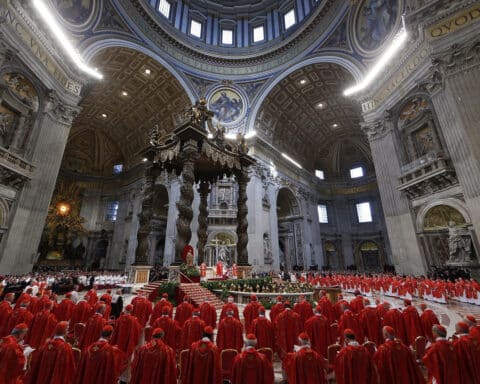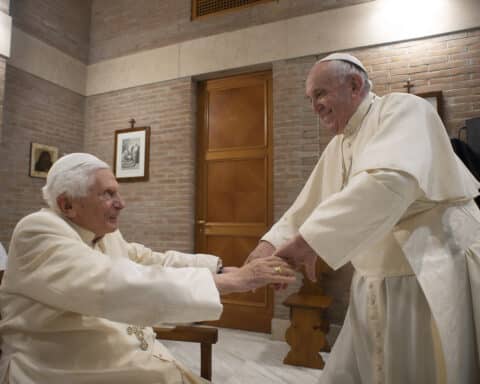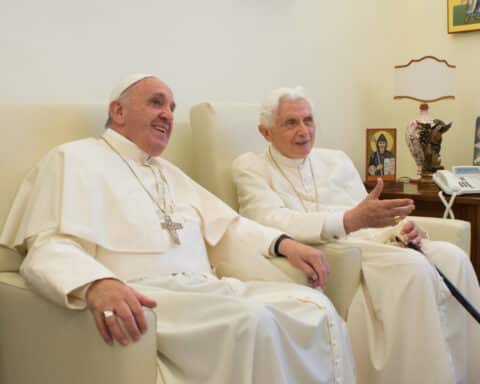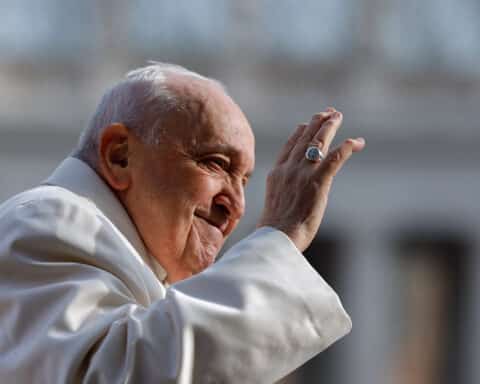How does one even begin to assess the legacy of Joseph Ratzinger/Pope Benedict XVI? His career spanned over 60 years, and he wore many hats during several tumultuous decades: priest, theologian, theological expert at the Second Vatican Council, author, bishop, head of the Congregation for the Doctrine of the Faith, pope and, finally, retired pope emeritus. One could write volumes on his legacy and still barely scratch the surface of his deep significance for the Church. But is it possible to find an Ariadne’s thread that connects all of the various aspects of his life together into a single, coherent trajectory? If we were to attempt such a construction, I think it is safe to say that through all of the various stages of his life the thing that most animated him, the one thing that guided him throughout his life, was his faith in the Incarnate Lord as the true manifestation of the face of God — and, as such, the most important metric for truth.
The God of all
One of his most consistent theological principles flows out of this faith, and that principle is his insistence on the priority of logos over ethos, which is just a fancy theological way of saying the priority of the truth of Christ over all of our various cultural constructions of reality. Therefore, for Joseph Ratzinger, the Incarnate Lord is not merely the head of the Church but the Lord of history as well. Cultures and empires come and go and tend to follow the same path of what St. Augustine called the libido dominandi (the desire to dominate and “possess”), which creates in its wake structures of power and coercion. The cynical question from Pontius Pilate directed at Our Lord — “what is truth?” — stands as the emblem of all such worldly powers whose “darkness” cannot comprehend the light of Christ.
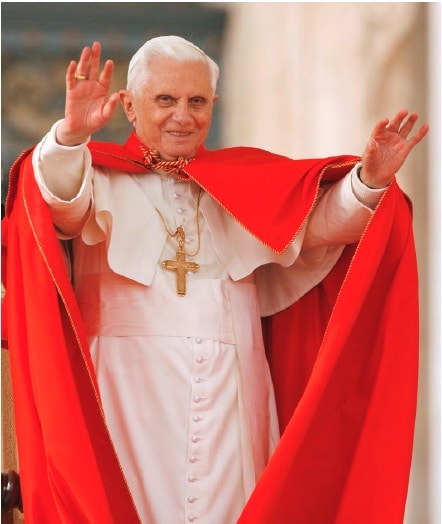
Notice that Christ does not answer Pilate’s question since “the truth” is actually standing before Pilate as the concreteness of God made flesh. His silence stands as a sharp rebuke to Pilate’s pretentiousness and cynicism since no answer is possible to the question of truth from within the confines of Pilate’s thought-world of imperial power. Along these same lines, for Pope Benedict, the biblical affirmation of the one God does not delegitimize civil authority as such, but unmasks its pretensions to absolute authority. As Jesus does say to Pilate with regard to Pilate’s claim to be the master of life and death, “You would have no power if it were not given to you from above.” This further implies that there can be no legitimate worldly kingdom that does not acknowledge this divine source for all truth and authority. In his wonderful book “Introduction to Christianity,” Joseph Ratzinger puts it thus:
“‘He has put down the mighty from their thrones’ (Lk 1:52); and in doing so it has shattered the political principle’s claim to totality once and for all. In this sense, the profession ‘There is only one God’ is, precisely because it has itself no political aims, a program of decisive political importance: through the absoluteness that it lends the individual from his God … it forms the only decisive protection against the power of the collective and at the same time implies the complete abolition of any idea of exclusiveness in humanity as a whole.”
God’s role in the world
We can discuss endlessly the various elements of Pope Benedict’s long career, but here we find the key to the whole. Faith in God is no mere superficial piety — a take-it-or-leave-it option that ultimately has little effect one way or the other on how we construct society. Faith is instead a form of knowledge about the most real thing that exists. Faith puts us in contact with the truth and meaning of everything. Faith is not merely a subjective emotion, although emotions play a role, of course, but it is instead a spiritual decision from the deepest core of our soul, which affirms not only the truth that God “is” but also the truth that this God reveals in Christ about who God is. As Jesus says in John’s Gospel, “Whoever has seen me has seen the Father” (Jn 14:9). And that should then translate into a changed way of viewing the world, the nature of humanity and our place in that world. And it should also change in noticeable and public ways how we act.
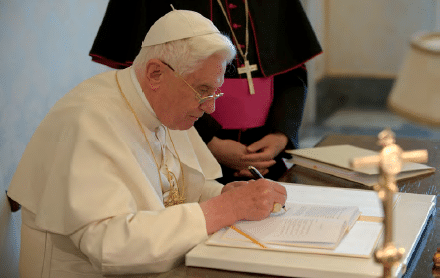
This, then, explains key aspects of Pope Benedict’s papacy and what he chose to prioritize. His first encyclical was Deus Caritas Est (“God is Love”) wherein Benedict affirms that the full meaning and truth of existence can only be found in love — and, more specifically, the cruciform, self-emptying structure of love as this is revealed to us in the life, death and resurrection of Jesus. This was of critical importance to Benedict since if God is real (and he is), and if God is the source, goal and meaning of all of creaturely existence (and he is), and if God is love (and he is), then the world can only truly be itself when it orients itself to this reality, to this infinite love. God is no add-on to our existence, like candy sprinkles on top of ice cream, but is the world’s truest fulfillment. And so, as Benedict points out, if we attempt to ignore God and to construct society and our lives as if God does not really matter, then we not only lose God but we lose the world and ourselves as well. We can cling to the illusion that this world is sufficient unto itself, but in doing so we destroy the world’s only possible meaning and set ourselves on the path of self-destruction.
Thus, for Pope Benedict, the greatest priority in the Church today is to first recognize that this is indeed the nature of our cultural crisis and then to realize that our efforts at reevangelization must begin and end with a desire to make God’s presence in the world tangible, visible and real again.
This is why Pope Benedict spoke so often of the erasure or the “eclipse” of God in modern society. The modern world is constructed on the very proposition that God is a complete irrelevance to how our secular society should operate, and that in the cultural sphere, this God should remain a purely private affair of subjective choice on a par with my preference for a cheeseburger over a fish sandwich. After the Protestant Reformation and the so-called wars of religion that ensued in Europe, a form of social and political discourse emerged that said that the only way to keep the peace is to keep religion out of anything of true importance to our social construction. And this meant far more than the “separation of Church and state,” and it flowed into a crass nullification of the question of God as in any way truly meaningful as a claim of truth. Thus, for Pope Benedict, the greatest priority in the Church today is to first recognize that this is indeed the nature of our cultural crisis and then to realize that our efforts at reevangelization must begin and end with a desire to make God’s presence in the world tangible, visible and real again. And that is the project of saint-making and sanctification. We do not need more programs and strategies. We need instead more saints. In his 2009 Letter to the Bishops of the Catholic Church concerning the Remission of the Excommunication of the Four Bishops Consecrated by Archbishop Lefebvre, Pope Benedict is quite blunt:
“In our days, when in vast areas of the world the Faith is in danger of dying out like a flame which no longer has fuel, the overriding priority is to make God present in this world and to show men and women the way to God. Not just any god, but the God who spoke on Sinai; to that God whose face we recognize in a love which presses ‘to the end’ (cf. Jn 13:1) — in Jesus Christ, crucified and risen. The real problem at this moment of our history is that God is disappearing from the human horizon, and, with the dimming of the light which comes from God, humanity is losing its bearings, with increasingly evident destructive effects.”
The freedom to choose God
This is also why Pope Benedict spoke so often of the “dictatorship of relativism” since, in a world without an explicit orientation to the God of Jesus Christ, you will end up with the paradox of a society that is at once permissive and puritanical, free and enslaved; in other words, if there is no ultimate truth, then partial truths will have to do. But partial truths have no real binding effect since they are grounded in nothing beyond the ever-changing stipulations of a purely cultural awareness. Therefore, they must be enforced rigorously using coercive means, lest the entire ruse of their alleged necessity be exposed for the illusion that it is. And this is really nothing more than the elevation of the lesser gods of blood and soil to pride of place — gods that can be quite bloodthirsty and violent in their own right. Who, then, will save us from our secular saviors? This is the question that Pope Benedict posed to the world. In the name of freedom from the God who allegedly enslaved us within the confines of his silly “rules,” we turn ourselves over to different gods who promise us liberation but which give us instead violence and totalitarianism.
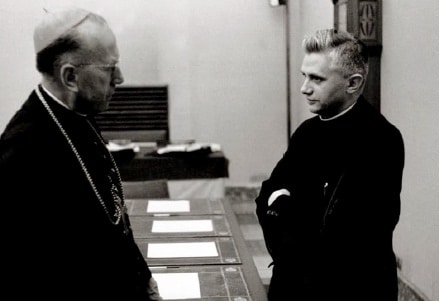
This does not mean, however, that Pope Benedict longed for the days when the Church and the state were united in a tight alliance of coercive power. Benedict was a strong critic of such arrangements since wherever and whenever the Church has sought to use state power to coerce the masses into religious compliance the Church has failed. And it failed not only on the practical level where such arrangements inevitably led to resentment, hostility and eventual rejection of the Faith as an enemy of freedom, but it also failed on the level of theological principle since the Faith is something that is only truly itself when it is offered freely in the evangelical embrace of the Christ and never when it is coerced through social pressure in ways that are deeply inauthentic and purely legalistic.
Along these lines, and once again highlighting the central theological importance of the question of truth for Benedict, he was a strong supporter of Dignitatis Humanae, which was the document of the Second Vatican Council that affirmed that religious freedom is a fundamental human right grounded in our dignity as creatures who are made in the image and likeness of God and also as creatures who are destined to love God in the freedom of faith. Truth is the central category of Benedict’s thinking, but not in a naive way as some set of easily provable algorithms. The truth of God can be seen and known by those with the spiritual eyes to see, but it is a truth oriented to freedom. For Pope Benedict there can be no truth without freedom and no freedom without truth. Our society has chosen an empty freedom without truth, but there are forms of the Faith that proceed as if you can “have” the truth of God without freedom. The truth of God is oriented to love and to the free embrace of faith wherein the creature, dramatically, responds to God’s tender gestures. God desires our free embrace in response, but it must be a truly free response.
Pope Benedict once famously predicted, already in the late 1960s, that the Church of the future would be a much smaller and less culturally consequential Church. But it will be a holier Church.
But this emphasis on truth freely embraced carries with it a consequence. And that consequence is that, in a culture that is oriented away from God and away from the truth of the Gospel, there will be millions of formerly “cultural” Christians who will fall away from the Faith. And it further means that for those who remain there will be great difficulties and obstacles thrown in their way. Pope Benedict once famously predicted, already in the late 1960s, that the Church of the future would be a much smaller and less culturally consequential Church. But it will be a holier Church since it will be a more cruciform Church, and those that remain will only be those who have done so by deliberate choice.
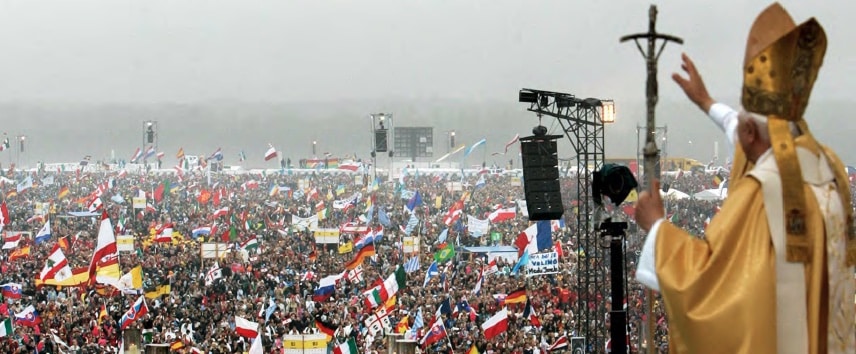
The nature of the Church
The task, therefore, for the Church today, for Benedict, was not to panic and to seek a facile accommodation to modern culture, which is a sad phenomenon that we have witnessed for the past 65 years in the Church as various theologians and Church leaders have chased breathlessly after the latest cultural fashions. The task instead must be to double down on the very essence of what the Church is by nature. And that is to be the sacrament of Christ in and for the world. Christ is the only reason the Church exists, her pearl of great price, and thus the path of Christological holiness is her one and only purpose. Here we see once again why it is that Pope Benedict thought Vatican II has an ongoing significance since the council affirmed that the nature of the Church is to be the sacrament of Christ to the world and to call all believers to holiness.
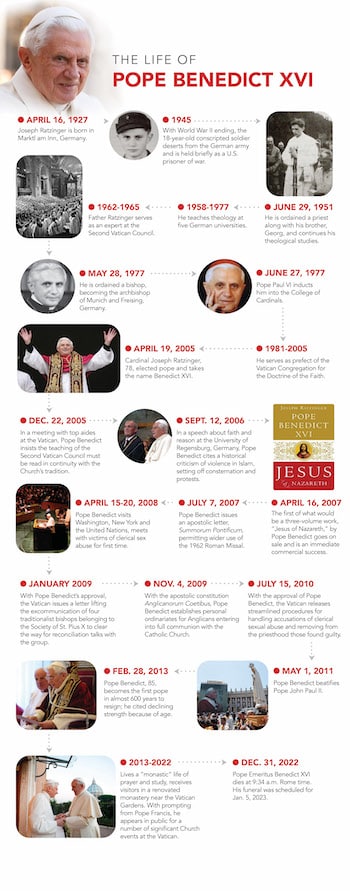
Our beloved Pope Benedict XVI has left us and is now with the Lord. He is now in that realm that St. Paul described as something no eye has seen, no ear has heard and no mind can even imagine — which was St. Paul’s way of saying that when we finally encounter the truth that is God, we will see that it is a love of unimaginable and infinite depths. And as I pray for Pope Benedict’s soul, I can only smile and imagine that he, too, is smiling, even if in purgatory, and is saying to himself, “At last! I am seeing Truth and beholding Glory.” The glory of the Lamb who was slain and who now reigns as the Lord of history.
Larry Chapp is a retired professor of theology. Find more of his writing at gaudiumetspes22.com.
| Reactions to the Holy Father’s passing |
|---|
|
— Archbishop Timothy P. Broglio of the Archdiocese for the Military Services and president of the U.S. Conference of Catholic Bishops
— President Joe Biden
— Cardinal Timothy Dolan, Archbishop of New York
— U.S. Senate Republican Leader Mitch McConnell |

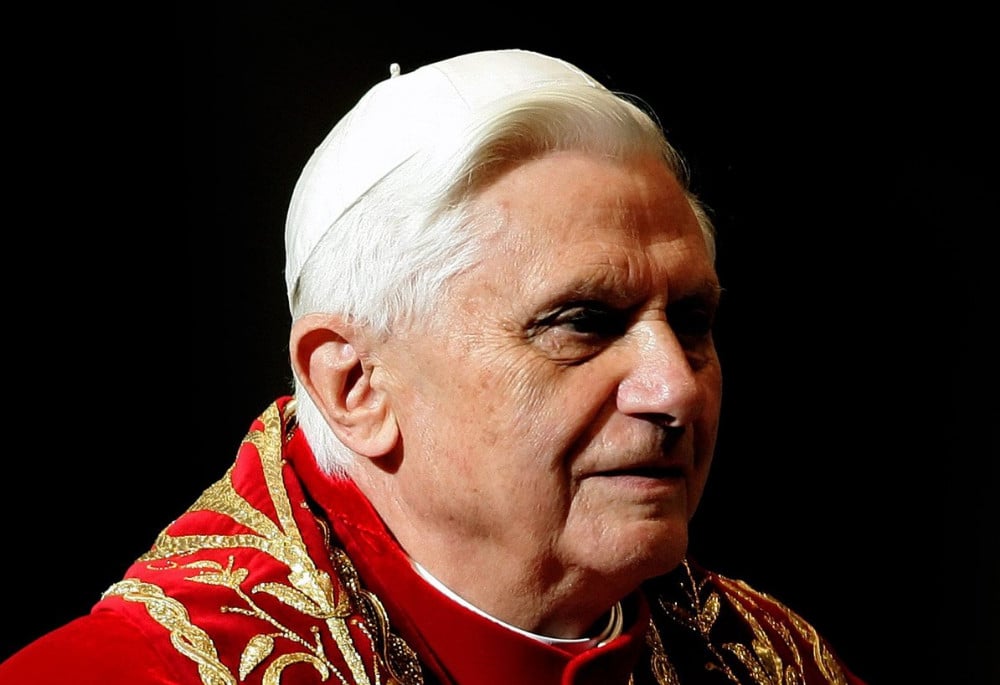
 “As a priest, university professor and theologian, archbishop, and cardinal, his voice in deepening an authentic understanding led all of us to a more profound love of truth and the mystery of God. It will take many years for us to delve more deeply into the wealth of learning that he has left us.”
“As a priest, university professor and theologian, archbishop, and cardinal, his voice in deepening an authentic understanding led all of us to a more profound love of truth and the mystery of God. It will take many years for us to delve more deeply into the wealth of learning that he has left us.” “Jill and I join Catholics around the world, and so many others, in mourning the passing of Pope Emeritus Benedict XVI. I had the privilege of spending time with Pope Benedict at the Vatican in 2011 and will always remember his generosity and welcome as well as our meaningful conversation.”
“Jill and I join Catholics around the world, and so many others, in mourning the passing of Pope Emeritus Benedict XVI. I had the privilege of spending time with Pope Benedict at the Vatican in 2011 and will always remember his generosity and welcome as well as our meaningful conversation.” “I personally sense the loss as he was so encouraging, and appointed me Archbishop of New York and nominated me a Cardinal.”
“I personally sense the loss as he was so encouraging, and appointed me Archbishop of New York and nominated me a Cardinal.” “Saddened to hear of the passing of Pope Emeritus Benedict XVI, a brilliant scholar and leading light for Catholics the world over. May he rest in peace.”
“Saddened to hear of the passing of Pope Emeritus Benedict XVI, a brilliant scholar and leading light for Catholics the world over. May he rest in peace.”